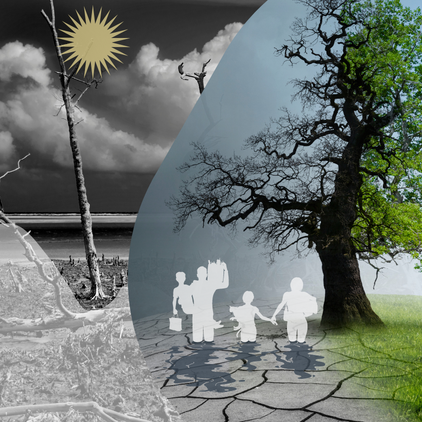
Climate change causes rising temperatures, extreme weather, sea level rise, and habitat loss. It leads to food and water scarcity, health risks, and forced migration. Urgent action is needed to mitigate these impacts.





Top 5 Ways to Prevent Copyright Violations in Your Content
Feel free to get in touch with us, and our team will respond promptly to assist you with your needs.
Climate change, one of the most urgent and complex challenges facing humanity, is no longer a distant threat. Its effects are unfolding before our eyes, influencing every corner of the globe. Rising temperatures, extreme weather patterns, and changes in ecosystems are transforming the way we live, affecting the environment, economies, and human well-being. The impacts of climate change are far-reaching, with some consequences irreversible and others escalating in severity. Let’s examine the dramatic consequences of climate change and explore why addressing it is paramount for our future.
The most widely recognized effect of climate change is the steady increase in global temperatures. According to the Intergovernmental Panel on Climate Change (IPCC), the Earth’s average temperature has already risen by about 1.2°C since the late 19th century, with most of the warming occurring in recent decades. This may seem like a small increase, but its effects are far-reaching. Warmer temperatures lead to:
Prolonged periods of extreme heat are becoming more common, especially in regions that historically experienced mild summers. These heatwaves are responsible for thousands of deaths annually and have severe impacts on agriculture, water availability, and energy consumption.
Higher temperatures are causing glaciers and ice sheets in the Arctic and Antarctic to melt. This contributes to rising sea levels, threatening low-lying coastal areas and islands with flooding. Major cities such as Miami, Jakarta, and Venice are already facing the prospect of sinking, while many coastal communities around the world are at risk of displacement.
The frequency and intensity of extreme weather events, such as hurricanes, typhoons, floods, and wildfires, have surged due to climate change. The rising heat energy in the atmosphere is fueling more powerful storms, while changes in precipitation patterns result in more intense floods or droughts.
Warmer ocean temperatures provide more fuel for tropical storms. This has led to stronger and more devastating hurricanes and typhoons in regions like the Caribbean, Southeast Asia, and the Gulf Coast. Hurricane Katrina in 2005 and Typhoon Haiyan in 2013 are just a glimpse into the devastating power of these storms.
In many regions, rising temperatures, prolonged droughts, and shifting weather patterns have led to an increase in wildfires. Forests are becoming more susceptible to burning, which not only destroys habitats but also releases carbon dioxide, exacerbating the climate crisis.
While some areas face extreme droughts, others are experiencing unprecedented flooding. For example, parts of Africa, California, and Australia are suffering from severe droughts that have disrupted agriculture and water supplies. On the flip side, floods in regions like Southeast Asia and South America are becoming more common, displacing communities and causing extensive damage to infrastructure.
Climate change is disrupting ecosystems worldwide, causing shifts in animal and plant behavior and threatening biodiversity. Species that were once well-suited to their environments are now struggling to survive as temperatures rise and habitats are destroyed.
Rising sea temperatures are causing coral reefs to bleach, as stressed corals expel the algae that give them their color and provide them with nutrients. This not only threatens the reef ecosystem but also impacts the millions of people who rely on reefs for food, tourism, and coastal protection.
As temperatures change, many species are forced to migrate to new habitats. In some cases, this has resulted in the displacement of entire ecosystems. Arctic species such as polar bears and seals are losing their ice habitats, while other animals are finding it difficult to adapt to new environments.
Climate change is altering growing seasons, shifting rainfall patterns, and creating more unpredictable weather. Crops such as wheat, rice, and maize are becoming increasingly vulnerable to droughts, floods, and pests. This jeopardizes food security, especially in developing nations that rely on agriculture for their livelihoods.
The impacts of climate change also extend to human health. As global temperatures rise, a wide range of health risks is intensifying.
Extreme heat waves are associated with an increase in heat-related illnesses, such as heat exhaustion, heat stroke, and dehydration. Vulnerable populations, including the elderly, children, and those with pre-existing health conditions, are particularly at risk.
Warmer temperatures and changing rainfall patterns are expanding the range of disease-carrying insects like mosquitoes and ticks. Diseases such as malaria, dengue fever, and Lyme disease are becoming more prevalent in regions previously unaffected by them.
The effects of climate change are also linked to air pollution, particularly in urban areas. Wildfires and extreme heat can exacerbate the levels of harmful pollutants in the air, leading to respiratory issues, heart disease, and other health problems.
The economic implications of climate change are staggering. From the destruction of infrastructure to the loss of agricultural productivity, the global economy is being reshaped by the effects of a warming planet.
Extreme weather events, rising sea levels, and flooding are causing billions of dollars in damages to infrastructure, including homes, roads, and bridges. The costs of rebuilding and adapting to new climate realities are staggering, putting immense pressure on governments and businesses.
As parts of the world become uninhabitable due to sea level rise, droughts, and wildfires, climate refugees are forced to migrate to other areas. This can lead to overcrowding in cities, increased competition for resources, and heightened political tensions.
As agricultural zones shift and crop yields become less predictable, food prices are likely to rise, leading to increased poverty and hunger. In many parts of the world, food insecurity is already a major concern, and climate change is exacerbating this issue.
The impacts of climate change are a stark reminder that time is running out to mitigate the worst effects. While some of the changes are already irreversible, there is still time to take action to reduce emissions, shift to renewable energy, and implement adaptation strategies.
Governments, businesses, and individuals all have a critical role to play. Transitioning to a green economy, investing in sustainable technologies, and implementing policies to curb carbon emissions are key steps toward safeguarding the future. Additionally, empowering communities to adapt to the changing environment through resilience-building and preparedness measures will be essential.
Pakistan faces a range of environmental issues, including the severe impacts of climate change, loss of biodiversity, deforestation, and deteriorating air and water quality. These problems threaten the country’s ecosystems and public health, creating urgent challenges for the nation.
Despite a struggling economy, Pakistan’s current administration has taken significant steps to address climate change. The Ten Billion Trees Tsunami Project is one such initiative, focusing on reforestation, improving air quality, managing wildlife, and controlling floods. These efforts aim to mitigate environmental damage and create a more sustainable future.
Pakistan was one of the first countries to establish a climate department and introduce a Climate Change Policy in 2012. This has provided a strong foundation for tackling climate hazards and adapting to the changing environment. However, Pakistan cannot address these issues in isolation.
Climate change is a global issue that affects the entire planet. The future of humanity depends on collective action. It is essential for the United Nations and all 195 countries to take immediate steps to tackle this crisis before it’s too late.
The impacts of climate change are already severe and will worsen without urgent action. From rising temperatures to disrupted ecosystems, the challenges are immense. However, we have the power to mitigate these effects by addressing the root causes and adapting to the changes. The time to act is now to ensure a sustainable and resilient future for generations to come.
“Ahmed Ali Dewan & Co. is a trusted law firm specializing in intellectual property, criminal law, family law, and corporate law. We provide expert legal services tailored to your needs, offering professional guidance in complex legal matters. Contact us today”